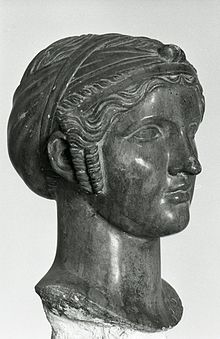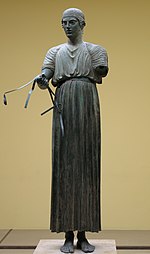Sappho Contents Life | Poetry | References | Other websites | Navigation menuGirl Interrupted: Who Was Sappho?Sappho : the "Brothers poem" (discov. 2014)e
Ancient Greek poetsBisexual peopleLGBT writers7th century BC births6th century BC deaths
Ancient GreekpoetLesbosEresosMytilenelyric poetrylyreepigramselegiacsiambicsHellenistic period
Sappho
Jump to navigation
Jump to search

A herma of Sappho
Sappho was an Ancient Greek lyrical poet. She was probably born around 630 BC on the island of Lesbos.[1] In the ancient world, Sappho's poetry was highly thought of. Today, most of it has been lost. Sappho presumably wrote about 10,000 lines of poetry, but only around 650 lines survive today.[2] Little is known for certain about Sappho's life.[3]
Sappho's poetry centers on passion and love for both men and women. The narrators of her poems often speak of infatuations and love for various females. Descriptions of physical acts between women are few and open to debate.[4] Whether these poems are meant to be autobiographical is not known, although elements of other parts of Sappho's life do make appearances in her work. It would be like her style to have these intimate encounters expressed poetically.[5]
Contents
1 Life
2 Poetry
3 References
4 Other websites
Life |

Portrait of Sappho, Palazzo Massimo alle Terme, Rome. Photo by Paolo Monti, 1969.
Little is known for certain about Sappho's life. What is known comes from three sources: Sappho's surviving poetry, other ancient writings about her, and evidence about archaic Greece in general.[6] She was born on the Greek island of Lesbos around 630 BC, in either Eresos or Mytilene.[7] Her parents' names are not known for certain, though her mother is often called Kleïs.[8] Ancient tradition gave at least eight possible names for her father.[7] One ancient story, which might be based on a now-lost poem by Sappho,[9] says that her father died when Sappho was still a child.[10] Sappho was said to have three brothers, called Charaxos, Larichos, and Eurygios. The "Brothers poem", discovered in 2014, talks about Charaxos and Larichos.[11]
Sappho might have had a daughter called Kleïs (the same as her mother). Two of Sappho's poems talk about her.[11] Not all historians agree that the Kleïs in Sappho's poems was Sappho's daughter. Some have suggested that she was Sappho's lover instead.[12] But ancient sources call Kleïs Sappho's daughter,[13] and some modern historians have argued that she must have been Sappho's daughter, not her lover.[14] Sappho's husband, the father of Kleïs, was said to be a rich trader named Kerkylas of Andros.[8] If Sappho was married, however, this was definitely not her husband's name: it is a joke from a comedy about Sappho's life.[7]
Poetry |
Sappho is best known for writing lyric poetry, a type of poetry which was sung and accompanied by the music of a lyre.[15] Most of her poetry focusses on the lives of women.[16] Much of this was love poetry,[17] but she also wrote hymns, wedding songs, and poetry about her family.[18] Some ancient sources say that Sappho wrote epigrams, elegiacs, and iambics (three other types of poetry with different metres to lyric poetry) as well as lyric poetry. However, none of these survive, and probably Sappho did not write in these styles.[19] Three epigrams attributed to Sappho survive, but they were written much later, probably in the Hellenistic period.[20]
References |
↑ Campbell, D. A. (ed.) (1982). Greek Lyric 1: Sappho and Alcaeus. Harvard University Press, Cambridge Massachusetts. p. xi
↑ Rayor, Diane and Lardinois, André (2014). Sappho: A New Translation of the Complete Works. Cambridge University Press, Cambridge. p. 7
↑ Rayor, Diane and Lardinois, André (2014). Sappho: A New Translation of the Complete Works. Cambridge University Press, Cambridge. p. 1
↑ Page, Denys (1959). Sappho and Alcaeus. Oxford University Press, Oxford. pp. 142-146
↑ Burnett, Anne Pippin (1983). Three archaic poets: Archilochus, Alcaeus, Sappho. Harvard University Press, Cambridge Massachusetts
↑ Rayor, Diane and Lardinois, André (2014). Sappho: A New Translation of the Complete Works. Cambridge University Press, Cambridge. p. 1
↑ 7.07.17.2 Rayor, Diane and Lardinois, André (2014). Sappho: A New Translation of the Complete Works. Cambridge University Press, Cambridge. p. 4
↑ 8.08.1 Rayor, Diane and Lardinois, André (2014). Sappho: A New Translation of the Complete Works. Cambridge University Press, Cambridge. pp. 3–4
↑ Campbell, D. A. (ed.) (1982). Greek Lyric 1: Sappho and Alcaeus. Harvard University Press, Cambridge Massachusetts. p. 15 n. 1
↑ Most, Glenn W. (1995). "Reflecting Sappho". Bulletin of the Institute of Classical Studies 40. p. 20
↑ 11.011.1 Rayor, Diane and Lardinois, André (2014). Sappho: A New Translation of the Complete Works. Cambridge University Press, Cambridge. p. 3
↑ Hallett, Judith P. (1982). "Beloved Cleïs". Quaderni Urbinati di Cultura Classica 10. p. 22
↑ Klinck, Anne L. (2008). "Sappho's Company of Friends", Hermes 136 (1). p. 21
↑ Hallett, Judith P. (1982). "Beloved Cleïs". Quaderni Urbinati di Cultura Classica 10. pp. 25–26; Parker, Holt N. (2006). "Sappho's Daughter/Clitoris/Lover". Rheinisches Museum für Philologie 149 (1). p. 112
↑ Mendelsohn, Daniel (2015). "Girl Interrupted: Who Was Sappho?". The New Yorker. Accessed 6 July 2016.
↑ Rayor, Diane and Lardinois, André (2014). Sappho: A New Translation of the Complete Works. Cambridge University Press, Cambridge. p. 9
↑ Campbell, D. A. (ed.) (1982). Greek Lyric 1: Sappho and Alcaeus. Harvard University Press, Cambridge Massachusetts. p. xii
↑ Rayor, Diane and Lardinois, André (2014). Sappho: A New Translation of the Complete Works. Cambridge University Press, Cambridge. pp. 8–9
↑ Rayor, Diane and Lardinois, André (2014). Sappho: A New Translation of the Complete Works. Cambridge University Press, Cambridge. p. 8
↑ Campbell, D. A. (ed.) (1982). Greek Lyric 1: Sappho and Alcaeus. Harvard University Press, Cambridge Massachusetts. p. xiii
Other websites |
Wikisource has original writing related to this article: Sappho |
| Wikiquote has a collection of quotations related to: Sappho |
| Wikimedia Commons has media related to Sappho. |
Sappho : the "Brothers poem" (discov. 2014) (text, transl., audio, recited in Greek by Ioannis Stratakis)
Categories:
- Ancient Greek poets
- Bisexual people
- LGBT writers
- 7th century BC births
- 6th century BC deaths
(RLQ=window.RLQ||[]).push(function()mw.config.set("wgPageParseReport":"limitreport":"cputime":"0.184","walltime":"0.240","ppvisitednodes":"value":757,"limit":1000000,"ppgeneratednodes":"value":0,"limit":1500000,"postexpandincludesize":"value":24989,"limit":2097152,"templateargumentsize":"value":623,"limit":2097152,"expansiondepth":"value":13,"limit":40,"expensivefunctioncount":"value":0,"limit":500,"unstrip-depth":"value":0,"limit":20,"unstrip-size":"value":8020,"limit":5000000,"entityaccesscount":"value":1,"limit":400,"timingprofile":["100.00% 148.292 1 -total"," 37.36% 55.399 1 Template:Commonscat"," 25.83% 38.311 1 Template:Reflist"," 18.34% 27.196 2 Template:Sister"," 18.28% 27.112 1 Template:Wikisource"," 16.88% 25.031 3 Template:Side_box"," 12.97% 19.228 1 Template:Ancient_Greece:_Arts_and_Culture"," 10.75% 15.938 1 Template:Navbox"," 7.59% 11.254 2 Template:Sec_link_auto"," 5.38% 7.973 1 Template:Commons"],"scribunto":"limitreport-timeusage":"value":"0.034","limit":"10.000","limitreport-memusage":"value":1397023,"limit":52428800,"cachereport":"origin":"mw1299","timestamp":"20190702111627","ttl":2592000,"transientcontent":false););"@context":"https://schema.org","@type":"Article","name":"Sappho","url":"https://simple.wikipedia.org/wiki/Sappho","sameAs":"http://www.wikidata.org/entity/Q17892","mainEntity":"http://www.wikidata.org/entity/Q17892","author":"@type":"Organization","name":"Contributors to Wikimedia projects","publisher":"@type":"Organization","name":"Wikimedia Foundation, Inc.","logo":"@type":"ImageObject","url":"https://www.wikimedia.org/static/images/wmf-hor-googpub.png","datePublished":"2006-06-14T21:23:11Z","dateModified":"2019-06-12T00:06:53Z","image":"https://upload.wikimedia.org/wikipedia/commons/a/a1/Bust_Sappho_Musei_Capitolini_MC1164.jpg","headline":"ancient Greek lyric poet"(RLQ=window.RLQ||[]).push(function()mw.config.set("wgBackendResponseTime":120,"wgHostname":"mw1273"););
